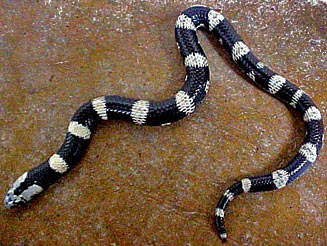|
Elapsoidea boulengeri (Zambezi garter snake)
Zambesikousbandslang [Afrikaans]
Life >
Eukaryotes
>
Opisthokonta >
Metazoa
(animals) > Bilateria > Deuterostomia >
Chordata >
Craniata > Vertebrata (vertebrates) > Gnathostomata (jawed vertebrates) >
Teleostomi (teleost fish) > Osteichthyes (bony fish) > Class:
Sarcopterygii (lobe-finned fish) > Stegocephalia (terrestrial vertebrates) >
Tetrapoda
(four-legged vertebrates) > Reptiliomorpha > Amniota >
Reptilia (reptiles) >
Romeriida > Diapsida > Lepidosauromorpha > Lepidosauria >
Squamata > Serpentes
(snakes) > Family: Elapidae > Genus:
Elapsoidea
 |
|
|
Elapsoidea boulengeri (Zambezi garter snake),
Mpumalanga. [photo M. Douglas ©,from
SARCA
Virtual Museum] |
|
Identification
The Zambezi garter snake can be identified as juvenile by
its white head, and mixed yellow and white bars which extend down its length; as
an adult these markings become harder to see and the only way to identify it is
by its cobra like threat response (it however doesn't have a hood) and its
nocturnal lifestyle. It rows to an average length of 60 cm but may reach a
maximum length of 77 cm.
Distribution and habitat
This garter snake species is found in Limpopo, eastern
Botswana, all of Zimbabwe and central Mozambique. It is found in a variety of
habitats ranging from lowland forest to arid savanna.
Food
Eats other snakes, amphibians and new born mice (in
captivity).
Predators, parasites and disease
Eaten by other snakes.
Reproduction
Oviparous (egg-laying), lays between 4 and 10 eggs in
summer.
Longevity
The average lifespan of this snake is likely to be 10
years.
Medical importance
This snakes venom maybe dangerous, but so far all known
bites have only resulted in pain and stiffness. These symptoms only last for a
short time and soon dissipate. Antivenom is not effective and should not be
used.
Links
References
-
Broadley, D.G. 1983. FitzSimons' Snakes of Southern
Africa. Delta Books, Johannesburg.
-
Marais, J. 2004. A Complete Guide to Snakes of Southern Africa.
Struik Publishing, Cape Town.
|
